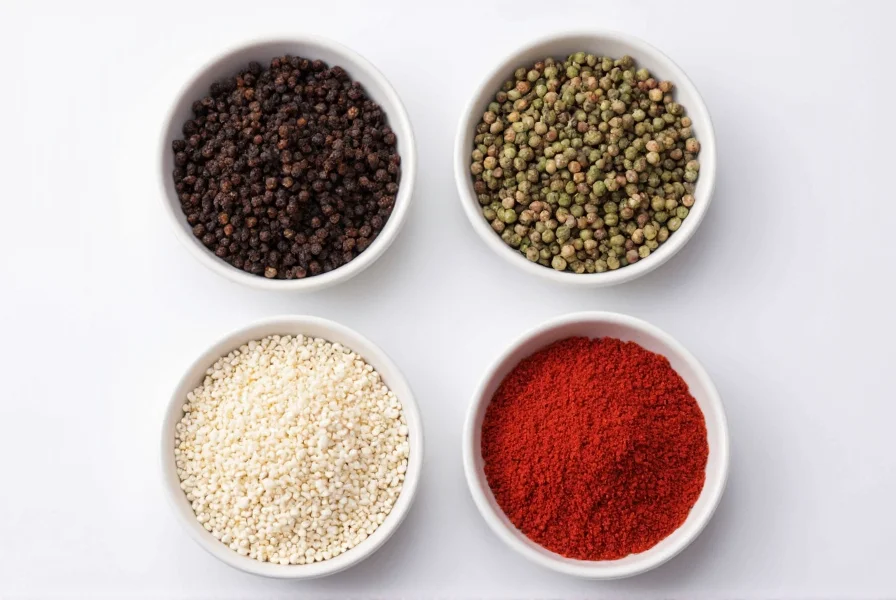Pepper has been prized as both a culinary staple and medicinal herb for thousands of years. This humble spice, derived from the Piper nigrum plant, contains bioactive compounds that contribute to its health-promoting properties. Understanding the science behind pepper's effects helps separate fact from culinary folklore.
Nutritional Profile of Black Pepper
Black pepper is low in calories but packs a nutritional punch relative to its serving size. A single teaspoon (about 2 grams) contains:
| Nutrient | Amount per Teaspoon | Daily Value % |
|---|---|---|
| Calories | 9 | 0.5% |
| Dietary Fiber | 0.5g | 2% |
| Manganese | 0.1mg | 4% |
| Vitamin K | 2.3mcg | 2% |
| Iron | 0.2mg | 1% |
The true star of black pepper is piperine, comprising approximately 5-9% of its composition. This alkaloid gives pepper its characteristic pungency and drives many of its researched health benefits related to black pepper nutritional value.

Science-Backed Health Benefits of Pepper
Enhanced Nutrient Absorption
One of pepper's most well-documented benefits is its ability to increase the bioavailability of other nutrients. Research shows that piperine can enhance the absorption of curcumin (from turmeric) by up to 2,000%. This explains why traditional Ayurvedic medicine often combines black pepper with turmeric—a pairing now validated by modern science studying black pepper and turmeric absorption.
Antioxidant Properties
Pepper contains multiple antioxidants that combat oxidative stress. A 2020 study published in the Journal of Food Science and Technology demonstrated that black pepper extract significantly reduced oxidative damage in cellular models. These antioxidant effects contribute to pepper's reputation as an anti-aging food.
Digestive Support
Consuming black pepper stimulates the production of hydrochloric acid in the stomach, which aids digestion and prevents issues like bloating and gas. This explains why many traditional cuisines incorporate pepper into meals—particularly those containing difficult-to-digest foods. For those wondering is black pepper good for digestion, the evidence suggests moderate consumption supports healthy digestive function.
Anti-Inflammatory Effects
Chronic inflammation underlies many modern diseases. Piperine has demonstrated anti-inflammatory properties in multiple studies. Research in the European Journal of Pharmacology found that piperine inhibited inflammatory pathways at the molecular level, suggesting potential benefits for conditions like arthritis.
Potential Concerns and Side Effects
While pepper offers numerous benefits, understanding when can too much pepper be bad for you is equally important:
- Gastrointestinal irritation: Excessive consumption may cause heartburn or stomach upset in sensitive individuals
- Medication interactions: Piperine affects liver enzymes that metabolize certain drugs, potentially altering their effectiveness
- Allergic reactions: Though rare, some people experience skin rashes or respiratory issues
- Pregnancy considerations: While culinary amounts are safe, medicinal doses should be avoided during pregnancy
People with ulcers, GERD, or inflammatory bowel conditions should monitor their tolerance to pepper. The question of how much pepper is healthy depends on individual factors, but typical culinary use (1/4 to 1/2 teaspoon daily) presents minimal risk for most people.
Pepper Varieties Compared
All true peppers come from the Piper nigrum plant but differ in processing:
- Black pepper: Made from unripe fruit, dried until wrinkled and dark—highest piperine content
- White pepper: Ripe fruit with outer layer removed—milder flavor, slightly lower piperine
- Green pepper: Unripe berries preserved—fresh flavor, similar piperine to black
- Red pepper: Fully ripe berries—sweetest flavor, lowest piperine content
For maximum health benefits, black pepper provides the highest concentration of piperine. Those exploring pepper health benefits scientific evidence will find most research focuses on black pepper due to its superior bioactive compound profile.

Practical Ways to Incorporate Pepper
To maximize benefits while enjoying pepper's flavor:
- Add freshly ground black pepper to turmeric-containing dishes
- Include in morning smoothies (¼ teaspoon)
- Sprinkle on roasted vegetables before serving
- Combine with healthy fats (like olive oil) to enhance absorption of fat-soluble compounds
- Use in homemade salad dressings and marinades
For those investigating black pepper for weight loss, some preliminary research suggests piperine may influence fat metabolism, but more human studies are needed before making definitive claims.
Conclusion
Pepper earns its place as a kitchen staple with legitimate health benefits supported by scientific research. Its ability to enhance nutrient absorption, provide antioxidant protection, and support digestive health makes it a valuable addition to a balanced diet. As with any food, moderation is key—culinary amounts pose minimal risk while delivering maximum benefit. When evaluating whether is pepper anti-inflammatory or offers other specific benefits, the evidence supports moderate consumption as part of an overall healthy eating pattern.
Does black pepper have any proven health benefits?
Yes, black pepper contains piperine which has demonstrated antioxidant, anti-inflammatory, and bioavailability-enhancing properties in scientific studies. It's particularly effective at increasing absorption of other nutrients like curcumin from turmeric. Research also suggests potential digestive benefits and possible support for metabolic health, though more human studies are needed for some claims.
Can eating too much black pepper be harmful?
While culinary amounts are safe for most people, excessive consumption (several tablespoons daily) may cause gastrointestinal irritation, heartburn, or interact with certain medications. People with ulcers, GERD, or inflammatory bowel conditions should monitor their tolerance. The piperine in black pepper can affect how the liver processes some medications, so consult your healthcare provider if you take prescription drugs regularly.
Is black pepper good for digestion?
Yes, black pepper stimulates hydrochloric acid production in the stomach, which aids protein digestion and prevents issues like bloating and gas. This is why many traditional cuisines incorporate pepper into meals. However, those with sensitive digestive systems may experience irritation from excessive amounts. For most people, moderate culinary use supports healthy digestive function.
Which type of pepper is the healthiest?
Black pepper contains the highest concentration of piperine, the compound responsible for most health benefits. White, green, and red peppers come from the same plant but undergo different processing, resulting in lower piperine content. For maximum health benefits, freshly ground black pepper is generally considered the healthiest option, though all varieties offer some nutritional value.
How much black pepper should I consume daily for health benefits?
Most research suggests that 1/4 to 1/2 teaspoon (about 0.5-1 gram) of black pepper daily provides sufficient piperine for health benefits without risk of side effects for most people. This amount is easily incorporated into regular cooking. Those using black pepper specifically to enhance absorption of other compounds (like turmeric) may benefit from slightly higher amounts, but should consult a healthcare provider for personalized recommendations.











 浙公网安备
33010002000092号
浙公网安备
33010002000092号 浙B2-20120091-4
浙B2-20120091-4